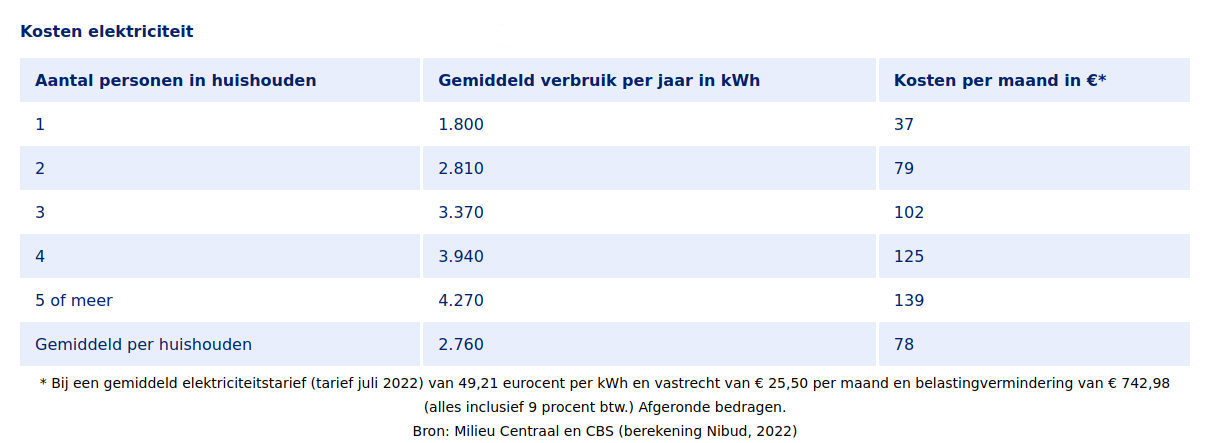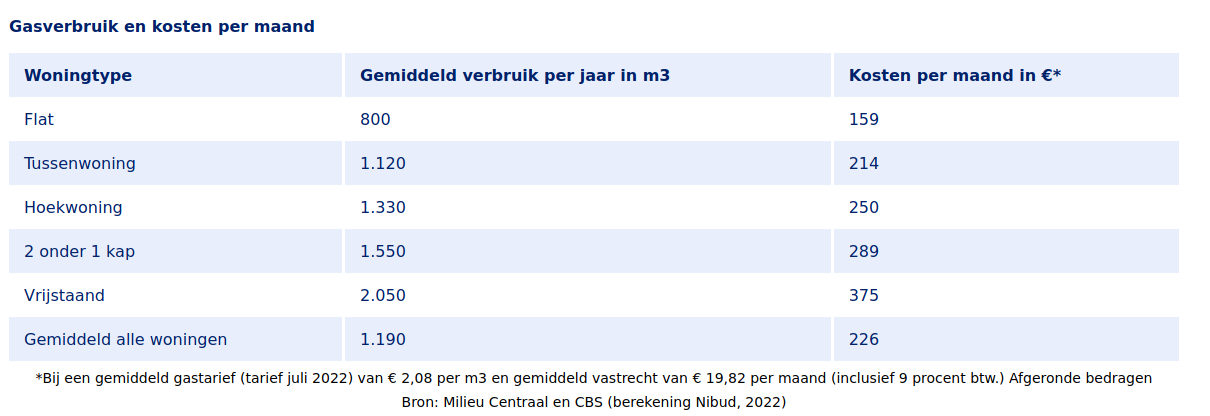Following the newly presented budget on (the yearly) Prinsjesdag, a couple of measures related to the current bad economic situation were revealed, and in particular and the most interesting were the measures against the current energy crisis. Or to be more exact, against the economical downturn that the whole society is experiencing, based on the elevated energy prices.
The main weapon in the hands of the government seems to be ... subsidies. Let the true socialist voice be heard!
The government will set a maximum unit price for gas and electricity that will cover the first 1,200 m3 of gas and 2,400 kWh of electricity – the annual fuel consumption for an average household. Any energy used above that level will be charged at an uncapped rate based on market prices.
This sounds great, isn't it? But as usual, the devil's in the details. A couple of remarks:
Energy consumption numbers are wrong
According to nibud.nl, the average energy consumption is for electricity:

and for the natural gas:

With the first 1200 cubic meters of gas, the government has it right. But with the electricity, it's completely off. The estimated 2400 might be close to the median of the households as per statistics, but it's actually in the range of a 1 to 2 members family. And if we consider that most of the families in the NL are definitely at least 2 people (with a lot being with 2-3 kids, therefore 4-5 persons), the electricity is hardly covered. At least, not how the government is selling it.
But an interesting consequence of this approach, is that the people will most likely revert from using electricity based heating to the gas based one (or at least until the 1200 m³ is reached). And the natural gas is the scarce resource at this point.
Capped prices are already high
The capped consumption is based on some prices that are already quite high: €1.50 per cubic metre of gas and €0.70/kwh. At this moment, with all the inflation and rises, electricity is around half that number. And before Feb it was around €0.23/kwh.
The cub is now around €1.60. This has the chance to go up quite fast, so the cap will work in this case.
The costs are in range of billions. Who's going to pay?
To run all this socialist operation, the government will have to spend a lot of money. Billions. And since the taxes will not be raised, most likely the source of the money will be ... ECB. That's right, the money printing machine of Europe. Which will translate in even more inflation.
The Financieele Dagblad described the budget as ‘last minute and chaotic’, following the late inclusion of an energy price cap. The paper said it cannot recall another occasion in which a hastily added measure has been presented without details about the billions of euros to finance it.
‘The Council of State has been promoting a budget which was done and dusted … Now there is a completely new plan without clarity about costs or financing. And it is to be carried out by a third party: the energy companies.’
The papers reaction is not quite, what we call, positive. Neither of people, that are hardly believing in the government capability to tackle down this crisis.
Availability
Everything above is based on the assumption that we'll have enough energy. And if the electricity has "no problem" on this side, since we just burn more coal to produce it, the natural gas is the big unknown.
The capping will also most likely push the prices up, since for the capped amounts, the government will cover the difference. Like any other price cap, the market will get altered. And not in a good way for the consumers.







